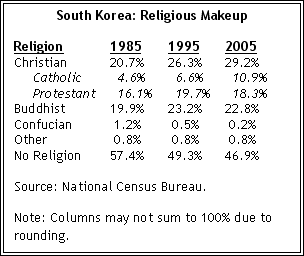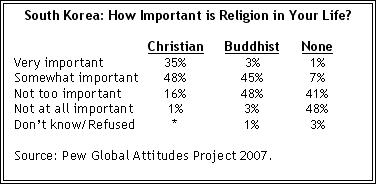by Luis Lugo, Director, and Brian J. Grim, Senior Research Fellow, Pew Forum on Religion & Public Life
The upcoming presidential election in South Korea on Dec. 19 is drawing attention to the growing presence of Christianity in a country that as recently as 1960 had fewer than a million Christians. The odds-on favorite in the race, Lee Myung-bak of the conservative Grand National Party, is a leader in one of South Korea’s largest churches, Somang Presbyterian Church. Lee, a former mayor of Seoul who once ran one of the country’s largest construction companies, is strongly supported by South Korea’s significant Protestant population.
By South Korean standards, Somang Presbyterian is not unusually large. South Korea, in fact, is home to 15 megachurches with an adult attendance of more than 10,000 people on a given Sunday.1 This includes the largest church in the world, the Yoido Full Gospel Church, which reports a membership of upwards of 800,000 and has an adult attendance of more than 230,000 on a given Sunday.

Approximately 30% of South Korea’s population now identifies as Christian, according to the 2005 national census. The growth in South Korean Christianity has been fueled at least in part by the rapid spread of pentecostal varieties of Protestantism. These pentecostal groups now represent approximately four-in-ten of the 25% of South Koreans in urban areas who self-identify as Protestant, according to a recent Pew Forum survey. The rapid growth in the number of Christian adherents in South Korea in the past 40 years has come largely at the expense of those who do not identify with any religion, whose percentage of the population decreased from 57% in 1985 to 47% in 2005. The number of South Koreans who identify themselves as Buddhist increased only slightly from approximately 20% in 1985 to 23% in 2005.


South Korea now has the largest percentage of Christians in East Asia, according to estimates of church statistics gathered by the World Christian Database. By contrast, the percentage of Christians in China and Taiwan is below 10%; in Japan and North Korea it is below 5%.

Not only are their numbers growing, but the level of religious intensity of South Korean Christians is much higher than that of other religious groups in the country. This is reflected in a recent survey by the Forum’s sister project, the Pew Global Attitudes Project, in which more than a third (35%) of South Korean Christians say that religion is very important in their lives. The comparable numbers among Buddhists and the unaffiliated are 3% and 1%, respectively.
This strong religious commitment on the part of South Korean Christians seems to drive their efforts to convert their fellow countrymen. Indeed, the Forum survey finds that a third (33%) of South Korean Christians share their faith with nonbelievers at least once a week, and another third (36%) share their faith at least several times a year. This strong evangelistic impulse does not stop at the water’s edge; it extends abroad as well. According to the Korean World Mission Association, there are now at least 14,000 South Korean Protestant missionaries, second only to the number of American Protestant missionaries. The targets of these missionary activities include places such as China, North Korea and Afghanistan, where the kidnapping of South Korean church volunteers by the Taliban last summer again called attention to these assertive missionary efforts.
The standoff with the Taliban generated considerable divisions back home, where resentment of the country’s Christian community appears to be growing. This resentment may be fed at least in part by the increasingly high public profile many South Korean Christians are assuming – not only in church life but also in corporate boardrooms and the National Assembly. Indeed, according to an August 2007 report in The Independent (U.K.), “the chairmen of all of South Korea’s top-10 companies are Christians, as are the majority of National Assembly members.”
Not only are more South Koreans identifying as Christian, but the Forum survey finds that they are very active in their congregations, with more than three-in-four (77%) saying they attend church at least once a week. In addition, the survey finds that half (50%) of South Korean Christians believe that religious groups should express their views on social and political questions, compared with slightly more than a quarter (28%) among their fellow countrymen. Moreover, the survey finds that two-thirds of South Korean Christians (67%) agree that it is important for political leaders to have strong religious beliefs, compared with less than one-in-four (22%) among the country’s non-Christian public.
If elected, Lee would not be the first Christian, nor the first Protestant, president of South Korea; the country’s first president, Syngman Rhee, for instance, was a convert to Methodism. But Lee’s election could serve to further underscore the growing public presence of the Christian community in South Korea as well as the increasing influence of South Korean Christians throughout Asia.
1Hong Young-gi, “Encounter with Modernity: The ‘McDonaldization’ and ‘Charismatization’ of Korean Mega-churches,” International Review of Mission, April 2003. Back to top




